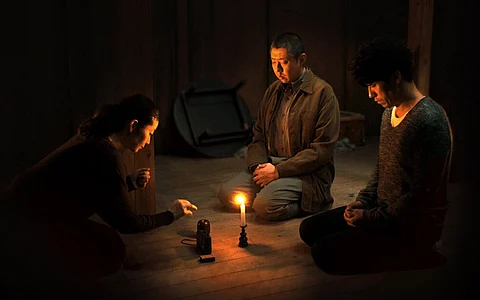
- In-Depth Stories
- Web Stories
- Reviews
- News
- FC Lists
- Interviews
- Features
- FC SpecialsFC Specials

Director: Sho Miyake
Cast: Yoshiyoshi Arakawa, Yuina Kuroshima
Streaming on: Netflix
Ju-On: Origins, Japan's first Netflix original horror series, opens with grainy recorded footage. Reporters swarm outside a house. "Ju-on was inspired by real events far more frightening than the movies," a voiceover intones. Six episodes later, the series delivers on that promise. It may not always be scary, but it is deeply unsettling.
The 'Ju-on' curse, as explained in Takashi Shimizu's Ju-On: The Grudge (2002), is born of someone killed in a fit of rage. In the film, it turns an unassuming two-storey Tokyo home into the site of several paranormal murders. The series acts as a prequel, going back to the first murder commited inside that house in 1952 and the ripple effects it has on families who either stay at the place or visit it over the next few decades.
Drawing on the film's fondness for interconnecting stories and jumping timelines, Ju-On: Origins juggles several characters from different walks of life whose shared trauma unfolds at the site of the house. Paranormal researcher Yasuo Odajima (Yoshiyoshi Arakawa) loses his father and sister shortly after moving in, an actress (Yuina Kuroshima) is haunted by the recurring sound of footsteps after her fiance visits the place, a schoolgirl (Ririka) is violently assaulted there by a classmate. The show's shifting narratives are easier to follow than the film's were, but still demand your full attention.
Fans of the film will recognise several of its recurring motifs here — women with flowing hair dressed in white, boys who huddle in the corner, mewling black cats, jealous husbands who suspect their wives of infidelity. The series downplays the more supernatural possibilities of these elements, however, using them to illustrate the cycles of abuse, neglect and mistreatment meted out by human beings. With or without a curse, these are people doomed to harsh lives, married to people they don't love, born to cruel and uncaring parents. In a nice touch, news reports of missing girls, dead businessmen, thousands killed in train accidents blare in the background throughout the series, as if to suggest that a haunted house is just one of the many things that could kill in this grim universe.
Wisely ascertaining that perhaps the pale-faced creeping woman of the film isn't as scary an image now as it was then, the series shows us little of its ghostly protagonist. When she does appear, it's behind opaque window panes or in the darkness of the attic through which she peeps out. It's a tactic that urges our imagination to fill in the gaps, building up suspense and effectively sustaining dread. By contrast, brutal scenes of rape, murder and dismemberment play out at length, with the camera up close and nowhere else to look but at the gore. A foetus being ripped from a pregnant woman's stomach is particularly chilling. In this series, the ghosts are peripheral, the real horror is in what people do to each other.
All of this makes for compelling, well-written characters with complex lives and arcs that just happen to cross paths with a haunted house. The researcher's frantic search for the house is as much a quest to understand how he escaped its curse as a child. His journey across Tokyo begins to veer inwards, towards his own memories and psyche. The bleakness rarely lets up, making the 30-minute-long episodes feel longer than they are. That the origin of the curse isn't fully explained is baffling given the show's title, but makes sense when you think about what the series is trying to say — the world is full of random acts of violence that all blur into each other, why should this one be any more distinct? This is a show that tests your patience just as much as it rewards it.